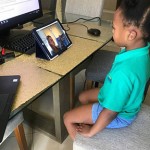The arrival of the COVID-19 pandemic in South Africa has destabilised the regular schooling system for all children. While the commencement of the revised school calendar is still not clear and fears of sending pupils back to school mount, some parents around the country are working closely with their children’s schools and supporting teachers by making sure that school children keep learning even during the lockdown period. The Durban University of Technology’s (DUT’s) Communication department’s Noxolo Memela spoke to some parents to find out how they have been coping with this sudden responsibility and how their children have been responding to the current state of affairs, and, this is what they had to say.
Dr Calvin Mabaso, a Lecturer at the University of Johannesburg and DUT Faculty of Management  Sciences alumnus said he has opened a mini-school in his house to make sure his son Langelihle is up to date with his schoolwork. “The COVID-19 pandemic has been one of the worst condition that the world has to deal with. It has been overwhelming for all of us but it took a toll on school children. Having to deal with this new setup has sparked a lot of fears amongst parents. However, it has been a struggle for most families because they had to deal with remote working, school work for their children, etc. Some mental health issues are associated with lockdown, especially for school children. Having to address all these challenges, we cannot afford further deterioration of our children’s learning. The majority of families have been struggling to implement the homeschooling during the COVID-19 pandemic,” said Dr Mabaso.
Sciences alumnus said he has opened a mini-school in his house to make sure his son Langelihle is up to date with his schoolwork. “The COVID-19 pandemic has been one of the worst condition that the world has to deal with. It has been overwhelming for all of us but it took a toll on school children. Having to deal with this new setup has sparked a lot of fears amongst parents. However, it has been a struggle for most families because they had to deal with remote working, school work for their children, etc. Some mental health issues are associated with lockdown, especially for school children. Having to address all these challenges, we cannot afford further deterioration of our children’s learning. The majority of families have been struggling to implement the homeschooling during the COVID-19 pandemic,” said Dr Mabaso.
Dr Mabaso is embracing the lockdown and has come up with positives. Over the past few weeks he has planned his son’s work, although he admits that this could be a difficult task for any parent who is not paying attention to their children’s education. The weekly milestone he has for his son, whereby he (Langelihle) is expected to cover the amount of work on all the subjects that he is doing does not come without incentives. “I believe that using structured activities is ideal so that he can focus on one subject at a time. This ensures that the child feels more secure and behaves better. Langelihle provides activities for every exercise in each day, he has breaks in between and I have provided some incentives for every work that he has finished (i.e chocolates, games etc) and these incentives have motivated him to do more,” he said.
Dr Mabaso monitors his son whilst he does his work, in some activities he has assisted but he admits that it has been a roller-coaster and is grateful that his role as an academic has played a great deal in coping with this new task. However, he has admitted that that issue of resources can also hinder the progress of learning (textbooks, internet) and because he (Dr Mabaso) is currently remotely working from home, this has helped them both a great deal. “We should be mindful that children are highly vulnerable in times of shock. Parents need to provide necessary support in terms of remote learning. I also believe that we should also teach each other parents on how to provide a remote schooling environment and share ideas in this regard. Therefore, efforts to reach young children need to begin by reaching parents with support, encouragement and practical, actionable ideas to support their children in this time of crisis. Even in the lowest-resource settings, in extreme deprivation, there are actions parents can take to protect and promote their children’s development,” echoed Dr Mabaso.
Meanwhile, Zodumo Maphumulo Faculty of Arts and Design Alumna and Football Production  Manager at Supersport International has found attempting to balance working from home, managing house chores and assisting her daughter Uyanda Sibisi with schoolwork, a major adjustment. “I have learnt to manage my time much more effectively to ensure all daily requirements can be met. Immediately after the country went into lockdown about a week later my daughter’s school communicated via email that parents could collect academic packs prepared by the school to assist with home schooling,” she said.
Manager at Supersport International has found attempting to balance working from home, managing house chores and assisting her daughter Uyanda Sibisi with schoolwork, a major adjustment. “I have learnt to manage my time much more effectively to ensure all daily requirements can be met. Immediately after the country went into lockdown about a week later my daughter’s school communicated via email that parents could collect academic packs prepared by the school to assist with home schooling,” she said.
At this point it became clear for Maphumulo that their kids will be learning from home and parents would have to facilitate. At the beginning Maphumulo found this to be quiet challenging, now having to assume the role of a teacher while managing my own work outputs and attending virtual office meetings. However, fortunately the relationship the school has with parents has made the task of being a sudden teacher, manageable and easy to adjust to. “I must admit that the school and teachers have been quiet supportive during this time, the school has kept close communication with parents via Whattsapp and assisted us greatly with setting up apps such as Zoom and educational apps such as Seesaw,” said Maphumulo.
However, she admits that it has not been an easy journey, making peace with the fact that not only does she have to embrace the new setup but also change her lifestyle and daily routine in order to be of great assistance to see through her daughter’s education during this period. “Personally the entire situation has been rather challenging and required a change in lifestyle and a change in daily routine, but for now this is life as we know it,” concluded Maphumulo.
While Dr Mabaso and Maphumulo are managing one child each, Journalism Part-time lecturer and Faculty of Arts and Design’s Alumna Khumbuzile Maisela-Mbuqe has had to make sure that she sticks to the routine she has for her two children, Khwezi and Banzi. However, it has been critical for Maisela- Mbuqe to have breaks in-between that routine because her children are still fairly young and their attention span is limited. “During the lockdown period what we try to do is keep a routine, we start doing homework around 8H30am, we work for about 30 to 40 minutes, and we then take a break. During the break we water the plants, make a snack or take a walk around the complex,” she said.
Mbuqe to have breaks in-between that routine because her children are still fairly young and their attention span is limited. “During the lockdown period what we try to do is keep a routine, we start doing homework around 8H30am, we work for about 30 to 40 minutes, and we then take a break. During the break we water the plants, make a snack or take a walk around the complex,” she said.
However, her major challenge is having to manage both children with one laptop when they both need the laptop to do e-learning. Therefore, she has had to be creative and make sure that whilst the one child is busy on the laptop she gives the other child a worksheet or some other activity to do. She has to juggle between the two and the amount of work that increases weekly has not made the task of being both a mother and teacher at the same time easy for her. “Its challenging that I only have one laptop and this sees me doing two things at once and because my children are still young, they both still need my attention. This is different to doing homework together daily ordinarily, but now we are doing classwork for longer periods and its more involved and more engaging. This can be difficult because I am not a teacher and I have found it to be testing, it tests your patience, your willpower and theirs as well because they are not used to being cramped up at home as much as they play outside they tend to get restless as well,” explained Maisela-Mbuqe.
She (Maisela-Mbuqe) strongly believes that while this time is challenging it should be embraced because it provides parents with the opportunity to be more involved and transition not only the children but also themselves to the time of e-learning.


